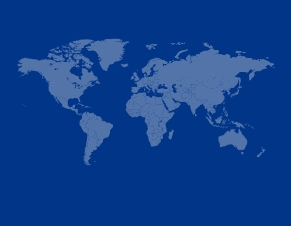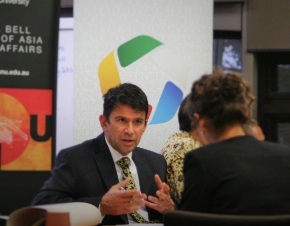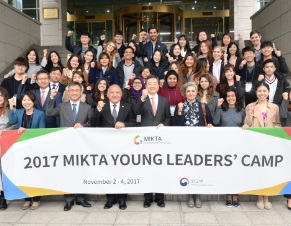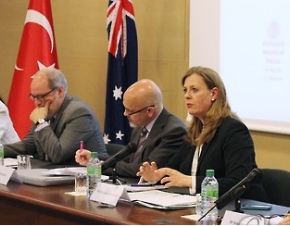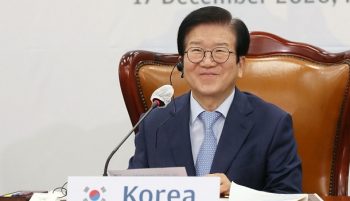8th MIKTA Speakers’ Consultation (İstanbul, 9 March 2023)

8th MIKTA Speakers’ Consultation
Joint Statement
1. We, the Speakers of the Parliaments of the MIKTA countries (Mexico, Indonesia, Korea, Türkiye, and Australia) gathered in Istanbul on 9 March 2023 for the 8th MIKTA Speakers’ Consultation on “Multilateralism, Global Interdependence and Parliaments”, where we exchanged views on the challenges and opportunities facing national parliaments in the 21st century and discussed the importance of promoting multilateralism and addressing global interdependence.
2. We, the Speakers of the Parliaments of MIKTA countries, expressed our deepest condolences to the Turkish people and the Government of Türkiye for the loss of lives as a result of the earthquakes in Türkiye on 6 February 2023, one of the worst disasters in the country’s history. We underlined that the strong solidarity shown by MIKTA countries by immediately deploying search and rescue teams and medical and humanitarian aid in the aftermath of the disaster is a welcome example of international cooperation in the face of disasters.
3. We underlined the importance of the MIKTA Speakers’ Consultation, which serves as a valuable forum for MIKTA member countries to exchange views, share successful practices, and seek ways of cooperation especially on regional and global issues.
4. We emphasized that today’s world has reached an unprecedented level of interconnectedness creating an increasingly interdependent and interrelated global community, and this kind of interdependence presents opportunities as well as challenges, especially as we are living in a fragmented world due to the rising global tensions that pose risks to the stability of global economy and security and that overcoming these challenges requires cooperation between countries, and that no country can solve these problems on its own.
5. In the face of increasingly complex global challenges, we reaffirmed that parliamentary diplomacy has become a crucial tool for building global dialogue and cooperation, and the role that national parliaments play in shaping international relations has become apparent.
6. Recognizing that the world is at a critical juncture and that the global security situation is under threat, we underlined that the international system and institutions are having difficulties in fulfilling their responsibilities to address ongoing challenges, such as the war in Ukraine and blatant provocations and threats posed by ballistic missile and nuclear programs against the wish of denuclearization in the Korean Peninsula as well as to prevent violence, restore peace, and ensure stability. We emphasized the need to strengthen the multilateral system and its institutions, in particular the United Nations, in order to better address these challenges and promote a more just and peaceful world order, and this will be possible through the reform of international institutions in the direction of enhancing democracy, accountability, representation, and efficiency, underpinned by the values of justice, pluralism and inclusiveness based on multilateralism, and invited the governments of the MIKTA member countries to take an active role in efforts towards reforming the international system.
7. We expressed our firm resolve to work together and our commitment to multilateralism in order to promote economic growth, social development and cultural exchange in support of the 2030 Agenda and its Sustainable Development Goals agreed by all member states in 2015.
8. We noted that while artificial intelligence and other new technologies have significant potential to support human and economic development, improve quality of life and solve global challenges, they also pose risks, such as discrimination, privacy violations, cybersecurity threats and disruption of labor markets. We affirmed the importance of ensuring that these technologies are developed and used in a responsible and transparent manner, taking into account international human rights law and norms, ethical values and the public interest, and emphasized the importance of establishing international standards and guidelines for the design, development and use of these technologies, while recognizing the potential opportunities and risks involved. We invited international organizations to prepare standards and guidelines in this regard and to carry out this work in cooperation with national parliaments.
9. We underlined that wars, terrorism, environmental disasters, natural disasters, poverty and food access constraints, which tend to increase every year, are factors that increase irregular migration, and in the framework of the positive and/or negative impacts of irregular migration on countries of origin, transit and destination countries, it is necessary to determine policies for the future. The human rights dimension of irregular migration should be considered in developing these policies.
10. We noted with appreciation the humanitarian approach of Türkiye, the country hosting the largest number of refugees in the world.
11. We called on the international community to cooperate on refugee mobility that requires safe, proper and adequate management in order to reduce its potential of exacerbating regional and global challenges as well as to create an enabling environment to share the burden.
12. We called for combating all forms of discrimination including xenophobia, racism and Islamophobia which have been on the rise all over the world in recent years and have even been used by mainstream political movements.
13. We indicated that recent crises such as epidemics, natural disasters and wars do not remain only regional but can affect every part of the globe, threatening food security and supply chains in parallel with climate change, further impoverishing economically vulnerable groups, and noted that strengthening the role of parliaments, especially in ensuring food security, protecting supply chains, and countering the negative impacts of climate change, will also empower peoples.
14. We underlined the importance of the shipment of Ukrainian grain across the Black Sea in the context of food security and commended Türkiye for its initiatives and mediation for the signing of the Black Sea Grain Initiative with the UN.
15. Emphasizing the importance of deepening cooperation and coordination between MIKTA member countries, we expressed that relations in political, economic, cultural, and social spheres should be moved forward based on trust and mutual understanding, and we reiterated our strong will to use all the opportunities of parliamentary diplomacy in this direction.
16. We expressed our appreciation and gratitude to the Grand National Assembly of Türkiye for its steadfast leadership in chairing and hosting the MIKTA Speakers’ Consultation, and look forward to closely working with the House of Representatives of the Republic of Indonesia during Indonesia’s chairmanship of MIKTA in 2023, so as to further advance MIKTA’s agenda and priorities.




